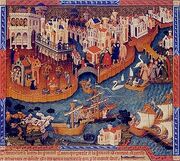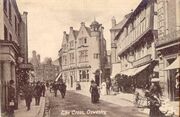| A transcribed and reformatted version of the Lineage setting on wiki.rpg.net |
In the world of Lineage setting, the Houses and Orders have been plotting throughout human history and a game about their machinations might be set in just about any place and period. A few examples follow:
Renaissance Italy[]

Venice
Florence in 1580 is a society in revolution as ideas and factions compete for power. After all of human history, the Rebellion has forced the House to make a truce and tolerate its open existance. The dominant position still lies firmly in the hands of the House of Medici, having extended their temporal power across all of Tuscany, their financial power across Europe and the Mediterranian, and having snatched the papacy from the House of Julii who had held it from its inception. Agents from many other Houses are at work in Florence, Julii plotting to return to power, the Houses of Abyssid and Ummayad from the Muslim world looking to deal with the powers of the west, the House of Capet looking for advantage for France, the House of Hapsburg looking for advantage for the Holy Roman Empire, and the Houses of York and Lancaster, each searching for a way to gain permanent ascendency over the other in England. The Flavii, never entirely driven from Italy even at the height of Julii rule, are returning in increasing numbers from the east. Their proud city of Byzantium may have fallen to the House of Abyssid, but they are still influential advisors in the courts of princes throughout the Muslim world and scheme eternally on behalf of one faction or another.
The two most influential orders of the Rebellion are the Order of Coppernicus and the Order of Siddhartha. Giddy with its success in unleashing the Rebellion across Europe, the Order of Coppernicus is ready to face any challenge, and works with boundless optimisism to bring reason, science and education to the peoples of Florence, openly scorning the Medici. Ironically, the shaking of the Christian faith has also allowed the Order of Siddhartha to flourish, as mages seek for a new humanocentric religion to replace the old. To the horror of the Medici, converts flock to the Indian-inspired order and to the Rebellion. Older rebel Houses endure in Italy too. The Order of Spartacus has been holding on since Roman times, infiltrating the armies and sowing the seeds of republican discontent with the nobility. The Order of Thales still holds court in the universities and monestaries, teaching mortals and mages alike to think critically about old assumptions. The Medici and others have long tried to ferret them out, but they are skillful and cunning.
Elizabethan England[]

Elizabethan clothing
In 1593, England has been at magewar for 140 years. The endless feud between York and Lancaster for the throne of England has reached stalemate as the other Houses maneuver for their own advantage. Warwick, who has gained control of most of the Protestant priesthood, does its best to keep the balance so that both sides will always need their help. Warwick’s betrayls have brought them power, but has also won them increasing rage and resentment from both sides. Anjou simply sides with whoever is offering them the most land at the time and is doing well for itself out of the conflict. House Medici remains neutral in the war. It does a great deal of bussiness in England but is committed to the return of state Catholocism, something Warwick will not stand for. Across the sea in Spain, the Hapsburgs plot the destruction of their English rivals, who have grown weak to external threat through constant infighting. The Hapsburgs have promissed the Medici than England will be Catholic if they win.
The Rebellion rages openly before the Houses, defying them to stop it. The Order of Coppernicus strives to spread learning and critical thinking, infiltrating the universities and publishing secret tracts. The Order of Wyatt, students of technological magic, plan to use the printing press to transform the world, levelling the rich and poor. The Order of Mary preaches that humanity can only be saved by Mary, the mother of Jesus. Mary is the only human being who has given birth to God and so is the only human being who can destroy God.
In Ireland, O'Conor Don and O'Reilly of Ulster continue centuries of feuding, even though they are both fighting to overthrow English rule. The Medici encourage their resistance in an effort to stave off Protestantism.
In Scotland, the royal House of Stuart plots to seize the throne of England. The English Houses have long accepted that they might have a king who is “Stuart” in name, but expect it to be a title only. The Scots, on the other hand, are planning to use the succession as a tool to actually take power. The House of Bruce, meanwhile, prepares to rebel against Stuart domination, calling them tyrants of limitless ambition, while the soldier-necromancers of the House of Macbeth look for any opportunity to rise in the world.
In Wales the House of Gwynedd wants to re-establish its domination, throwing out the English. However, the other Houses of Wales have little loyalty to Gwynedd and little trust, prefering to resist independently. The animal-mages of the House of Cunedda start the world’s first known animal rights movement, giving them some unusually progressive views on human rights by extension.
Victorian England[]

Victorian England
In 1880, the great English Houses of Stuart, Lancaster, Warwick, York and Anjou scheme with and against each other for control of Britain and the Empire, jockeying for position and power. The Rebellion rages openly, defying Heaven and Hell and frequently coming into conflict with the House over mortal politics. Houses from beyond England chafe at English rule and plot liberation and independence, or empires of their own.
The House of Stuart has ultimate sway over the British Empire, holding both the monarchy and parliament. It holds its position by working with the great English Houses of Lancaster, Warwick, and York, doing its best to play the others off against each other. Lancaster, long in eclipse, has risen to prominence again on the back of the industrial revolution. Early to recognize the importance of the factory, Lancaster invested heavily in the manufacturing industry and has become staggeringly wealthy. Warwick infects the civil service, higher education and the newspaper industry, seeking power through persuasion and deal-making as it has always done. York is dominant in the increasingly important mining industry and is the backbone of the British army. The last of the great English Houses, Anjou, is in the political wilderness. They are still wealthy in land and livestock but have been unable to adapt to the modern world and search for any way to overthrow the established order, even if it means collaborating with anarchists or more dangerous things from beyond.
While the great Houses strive for temporal power, the Rebellion openly defies Heaven and Hell. Most powerful among the rebels is the Order of Boudicca, founded the century before, but seeking its inspiration from ancient times. While most in the order support the extension and strengthening of the empire, on the grounds that their own strength and independence grows with it, others are increasingly having doubts about the morality of ruling others, fearing that England has turned into the despised Rome. The order is little trusted by rebels from other countries, who tend to favor local independence. There are frequent clashes between the Order of Boudicca, who champion the welfare of the common English people and the great English Houses, who champion profit and power for themselves. Both within the rebellion and without, there are the stirrings of what will one day become the rebel Order of Darwin, as mages of a scientific bent become increasingly inspired by what they take the implications of evolutionary theory to be.
Great Houses from beyond England compete with the empire for power, or chafe under English domination. With the House of Abyssid dominating the Ottoman Empire and the House of Romanov dominating Russia, and with France controlled by a cabal of hostile Houses, conflict for imperial holdings is frequent and intense. Local independence movements are spearheaded by such Houses as O'Conor Don of Ireland, famous for their charms and illusions, Bruce of Scotland, famed for their curses and battle magic, Gwynedd of Wales, enchanters and sorcerous musicians, and the many feuding Houses of India. Naturally, every significant faction is likely to have agents in England.
